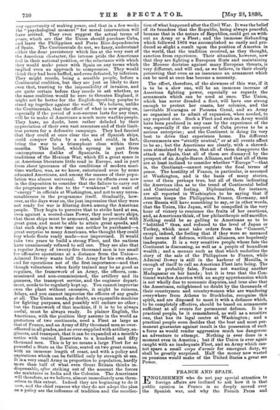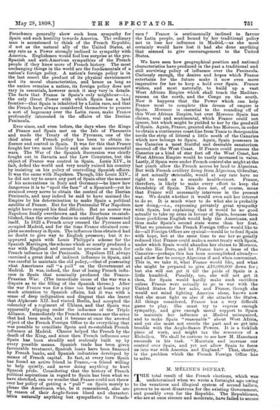FRANCE AND SPAIN.
ENGLISHMEN who do not pay special attention to foreign affairs are inclined to ask how it is that public opinion in France is so deeply moved over the Spanish war, and why the French Press and Frenchmen generally show such keen sympathy for Spain and such hostility towards America. The ordinary man is accustomed to think of the French Republic, if not as the natural ally of the United States, at any rate as a Power strongly inclined to sympathy with America. Englishmen would feel less surprise at the pro- Spanish and anti-American sympathies of the French people if they knew more of French history. The most unchanging things in the world are the fundamentals of a nation's foreign policy. A nation's foreign policy is in the last resort the product of its physical environment and its moral characteristics, and hence as long as the nation remains a nation, its foreign policy does not vary in essentials, however much it may vary in details. The facts that France is Spain's only neighbour—i.e., the only Great Power with which Spain has a land frontier—that Spain is inhabited by a Latin race, and that the French have always considered themselves to possess a sort of hegemony over the Latin races, make France profoundly interested in the affairs of the Iberian Peninsula.
Ever since, and even before, the days when the Kings of France and Spain met on the Isle of Pheasants and made the Treaty of the Pyrenees, one of the chief aims of French policy has been to obtain in- fluence and control in Spain. It was for this that France fought her two most bloody and also most unsuccessful wars. The War of the Spanish Succession was chiefly fought out in Bavaria and the Low Countries, but the object of France was control in Spain. Louis XIV., in fact, defied the world and very nearly ruined his country by insisting on his policy of controlling Spanish affairs. It was the same with Napoleon. Though, like Louis XIV., he did not try to annex any part of Spain after the manner of his annexations in Italy and Germany—he knew how dangerous it is to ‘' spoil the face" of a Spaniard—yet he strained every nerve to obtain the control of the Iberian Peninsula, and may indeed be said to have maimed the Empire by his determination to make Spain a political satellite of France. But for the Peninsular War Napoleon might have escaped his final debdcle. But no sooner was Napoleon finally overthrown and the Bourbons re-estab- Wished, than the secular desire to control Spain reasserted itself. In 1823 a French army crossed the Pyrenees and occupied Madrid, and for the time France obtained com- plete ascendency in Spain. The influence thus obtained had no doubt to give way to English pressure ; but it re- appeared again with Louis Philippe's scheme for the Spanish Marriages, the scheme which so nearly produced a war with England and seemed to promise so much for French influence in the Peninsula. Napoleon III. always exercised a great deal of indirect influence in Spain, and was careful to maintain the old policy,—that of possessing what Americans call "a pull" on the Government at Madrid. It was, indeed, the fear of losing French influ- ence in Spain that nominally produced the Franco- Prussian War. (The immediate cause of the war was a dispute as to the filling of the Spanish throne.) After the war France was for a time too busy at home to pay much attention to Spanish affairs, but it was with a sense of deep indignation and disgust that she learnt that Alphonso XII. had visited Berlin, had accepted the colonelcy of a regiment of Uhlans, and that Spain was apparently slipping under the influence of the Triple Alliance. Immediately the French statesmen saw the error that had been made, and it became at once the avowed object of the French Foreign Office to do everything that was possible to conciliate Spain and re-establish French influence at Madrid. Chance helped the French by the death of the King, and since then French influence over Spain has been steadily and zealously built up by every possible means. Spanish trade has been given favourable treatment, Spanish loans have been financed by French banks, and Spanish industries developed by means of French capital. In fact, at every turn Spain has found an active friend in France,—a friend willing to help quietly, and never doing anything to hurt Spanish pride. Considering that the history of French political aspirations in regard to Spain has been what we have sketched, can we wonder that France could not throw over her policy of getting a " pull " on Spain merely to please the Americans, who, be it remembered, also are by reason of their Anglo-Saxon blood and character- istics naturally anything but sympathetic to French- men ? France is sentimentally inclined to favour the Latin people, and bound by her traditional policy not to lose her influence in Madrid,—as she most certainly would have lost it had she done anything that seemed to give encouragement to the United States.
We have seen how geographical position and national characteristics have produced in the past a traditional and still surviving policy of influence over the Peninsula. Curiously enough, the desires and hopes which France. entertains for the future make it now even more imperative for her to keep a hold over Spain. France wishes, and most naturally, to build up a vast West African Empire which shall touch the Mediter- ranean on the north, and the Congo on the south. Now it happens that the Power which can help France most to complete this dream of empire is Spain. Morocco is essential to the rounding off of this West African Empire, but over Morocco Spain has claims, real and. sentimental, which France could not ignore, but which might be yielded to her by the goodwill of Spain. Again, France, granted she has Morocco, in order to obtain a continuous coast-line from Tunis to Senegambia. needs the strip of littoral a little south of the Canaries which now belongs to Spain. Again, Spain possesses in the Canaries a most fruitful and desirable sanatorium moored off the West Coast. If France could possess the Canaries as a kind of star fort off the West Coast, her West African Empire would be vastly increased in value. Lastly, if Spain were under French control she might at the last pinch allow the French access by land to Algeciras. But with French artillery firing from Algeciras, Gibraltar, if not actually uttenable, would at any rate have no right to rank as a seaside health-resort. France, therefore, is likely to make every effort to keep the friendship of Spain. This does not, of course, mean that France will necessarily intervene in the present war. We doubt whether it would even suit her interest to do so. It is much wiser to do what she is probably now doing,—i.e., expressing privately great sympathy with Spain, but explaining that it would be no good actually to take up arms in favour of Spain, because then those perfidious English would help the Americans, and thus make Spain's second state worse than her first. What we presume the French Foreign Office would like to do—all Foreign Offices are cynical—would be to feed Spain with hope, but at the same time to see her so greatly reduced that France could make a secret treaty with Spain, under which Spain would abandon her claims to Morocco, cede the Rio Doro, and let France have a lease of the Canaries—perhaps this has been accomplished already— and allow her to occupy Algeciras if and when convenient. This is, we take it, what France would like, and what she might be prepared to give £10,000,000 down for ; but she will not get it till the pride of Spain is a little humbled. Possibly, too, she will not get it then, for Spain would hardly make such sacrifices unless France were actually to go to war with the United States for her sake, and France, though she would not mind fighting America alone, knows now that she must fight us also if she attacks the States. All things considered, France has a very difficult game to play. She must try to express enough sympathy, and give enough moral support to Spain to maintain her influence at Madrid unimpaired, and to make Spain " reasonable " about West Africa, and yet she must not overdo the part and so get into trouble with the Anglo-Saxon Powers. It is a ticklish piece of work, and might tax the resources of a Richelieu. We shall be curious to see how M. Hanotaux succeeds in his task. "Maintain and increase our control over Spain, and yet not allow Spain to force us into war with America and England." That, shortly, is the problem which the French Foreign Office has to solve.



































 Previous page
Previous page